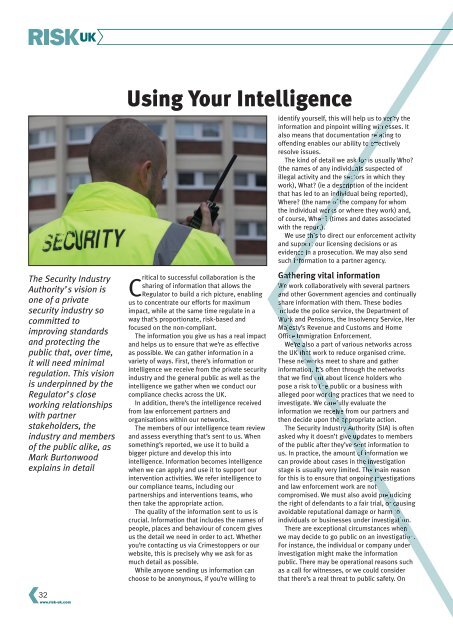RiskUKDecember2017
You also want an ePaper? Increase the reach of your titles
YUMPU automatically turns print PDFs into web optimized ePapers that Google loves.
The Security Industry<br />
Authority’s vision is<br />
one of a private<br />
security industry so<br />
committed to<br />
improving standards<br />
and protecting the<br />
public that, over time,<br />
it will need minimal<br />
regulation. This vision<br />
is underpinned by the<br />
Regulator’s close<br />
working relationships<br />
with partner<br />
stakeholders, the<br />
industry and members<br />
of the public alike, as<br />
Mark Burtonwood<br />
explains in detail<br />
Using Your Intelligence<br />
Critical to successful collaboration is the<br />
sharing of information that allows the<br />
Regulator to build a rich picture, enabling<br />
us to concentrate our efforts for maximum<br />
impact, while at the same time regulate in a<br />
way that’s proportionate, risk-based and<br />
focused on the non-compliant.<br />
The information you give us has a real impact<br />
and helps us to ensure that we’re as effective<br />
as possible. We can gather information in a<br />
variety of ways. First, there’s information or<br />
intelligence we receive from the private security<br />
industry and the general public as well as the<br />
intelligence we gather when we conduct our<br />
compliance checks across the UK.<br />
In addition, there’s the intelligence received<br />
from law enforcement partners and<br />
organisations within our networks.<br />
The members of our intelligence team review<br />
and assess everything that’s sent to us. When<br />
something’s reported, we use it to build a<br />
bigger picture and develop this into<br />
intelligence. Information becomes intelligence<br />
when we can apply and use it to support our<br />
intervention activities. We refer intelligence to<br />
our compliance teams, including our<br />
partnerships and interventions teams, who<br />
then take the appropriate action.<br />
The quality of the information sent to us is<br />
crucial. Information that includes the names of<br />
people, places and behaviour of concern gives<br />
us the detail we need in order to act. Whether<br />
you’re contacting us via Crimestoppers or our<br />
website, this is precisely why we ask for as<br />
much detail as possible.<br />
While anyone sending us information can<br />
choose to be anonymous, if you’re willing to<br />
identify yourself, this will help us to verify the<br />
information and pinpoint willing witnesses. It<br />
also means that documentation relating to<br />
offending enables our ability to effectively<br />
resolve issues.<br />
The kind of detail we ask for is usually Who?<br />
(the names of any individuals suspected of<br />
illegal activity and the sectors in which they<br />
work), What? (ie a description of the incident<br />
that has led to an individual being reported),<br />
Where? (the name of the company for whom<br />
the individual works or where they work) and,<br />
of course, When? (times and dates associated<br />
with the report).<br />
We use this to direct our enforcement activity<br />
and support our licensing decisions or as<br />
evidence in a prosecution. We may also send<br />
such information to a partner agency.<br />
Gathering vital information<br />
We work collaboratively with several partners<br />
and other Government agencies and continually<br />
share information with them. These bodies<br />
include the police service, the Department of<br />
Work and Pensions, the Insolvency Service, Her<br />
Majesty’s Revenue and Customs and Home<br />
Office Immigration Enforcement.<br />
We’re also a part of various networks across<br />
the UK that work to reduce organised crime.<br />
These networks meet to share and gather<br />
information. It’s often through the networks<br />
that we find out about licence holders who<br />
pose a risk to the public or a business with<br />
alleged poor working practices that we need to<br />
investigate. We carefully evaluate the<br />
information we receive from our partners and<br />
then decide upon the appropriate action.<br />
The Security Industry Authority (SIA) is often<br />
asked why it doesn’t give updates to members<br />
of the public after they’ve sent information to<br />
us. In practice, the amount of information we<br />
can provide about cases in the investigation<br />
stage is usually very limited. The main reason<br />
for this is to ensure that ongoing investigations<br />
and law enforcement work are not<br />
compromised. We must also avoid prejudicing<br />
the right of defendants to a fair trial, or causing<br />
avoidable reputational damage or harm to<br />
individuals or businesses under investigation.<br />
There are exceptional circumstances when<br />
we may decide to go public on an investigation.<br />
For instance, the individual or company under<br />
investigation might make the information<br />
public. There may be operational reasons such<br />
as a call for witnesses, or we could consider<br />
that there’s a real threat to public safety. On<br />
32<br />
www.risk-uk.com

















